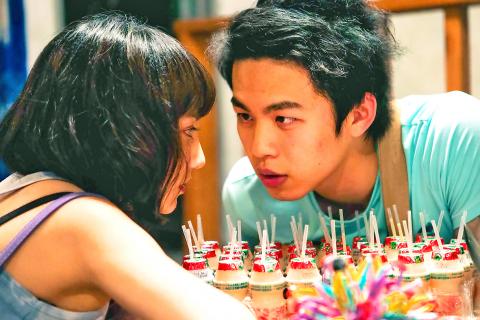Chang Tso-chi’s (張作驥) new film Thanatos, Drunk (醉‧生夢死) feels like a lethal projectile striking at the core of humanity. After covering subjects such as maternal warmth and reconciliation in When Love Comes (當愛來的時候) and childhood innocence in A Time in Quchi (暑假作業), the auteur returns to his familiar world inhabited by social underdogs, gangsters and prostitutes — a vision that is much fiercer and more emotionally poignant than before.
The drama revolves around a smothering, alcoholic mother and two brothers, one straight, one gay. In the prologue, Rat, played by newcomer Lee Hong-chi (李鴻其), dances with his drunk mother (Lu Hsueh-feng, 呂雪鳳) in their dingy home beside the Tamsui River (淡水河). In an inebriated haze, the mother laments her lot as a discarded wife. She nags Rat to get a job and worries about her older son, Shang-ho (Huang Shang-ho, 黃尚禾), who has just returned from living in the US.
As in Chang Tso-chi’s previous works, our protagonist, Rat, is trapped in a vicious cycle of despair and violence. We follow the tormented tough closely as he wanders through narrow back alleys, hawks vegetables at a wet market and hangs out with Shuo (Cheng Jen-shuo, 鄭人碩), a gigolo whom he idolizes and with whom he shares a flat.

Photo courtesy of Swallow Wings Films
Shang-ho works by day at a film company in Ximending (西門町) and parties at gay clubs by night. It soon becomes apparent that Shang-ho and Shuo are attracted to each other.
Meanwhile, Rat falls in love with a mute hooker (Chang Ning, 張甯), and violently attacks her johns. Soon the past catches up with the volatile punk and his gigolo friend, who are forced to settle an old score.
In Thanatos, Drunk, the narrative is not linear. Past and present are juxtaposed, merged and interwoven. In one scene, Shuo and other gigolos entertain clients; in another he sleeps with his girlfriend (Wang Ching–ting, 王靖婷), Rat’s cousin, in their cramped room by the bleak river. There are no flashbacks, and only through repetitive, similar sequences do we pick up clues here and there that give an idea of what has been happening.

Photo courtesy of Swallow Wings Films
This temporal removal helps to create a sense of immediacy as the characters wander through the mundane landscape of their lives, from being alone on the rooftop gazing off into the skyline to drunken ramblings over empty bottles in a claustrophobic room.
But this deceptively realistic surface reveals internal struggles underneath. Emotional entanglements erupt and implode through casual conversations, daily routines and habitual reactions.
And that is the genius of Chang Tso-chi, who makes it all seem so spontaneous and effortless.
The film works because the director has assembled actors who deliver authentic performances. In particular, first-time actor Lee looks both vulnerable and cruel as an angry young man wracked with guilt.
Critics have argued that the alcoholic mother, played by Lu Hsueh-feng, is the soul of the film. Lu summons emotional strength and sincerity to lift her role from a sobbing, alcoholic wreck to a maternal force too potent and restless that it ends up suffocating and consuming her own children.
Chang Tso-chi is known for using animal metaphors. Rat’s weird fixation on his pet ants, maggots and a half-dead pomfret presents a microcosm of the director Chang’s cinematic world, sordid and violent, while dotted with rare moments of lucidity.
Thanatos, Drunk is, without a doubt, one of Chang Tso-chi’s best and most despairing works to date. It is curious to note that the film was made during a very troubling time for the director, who was convicted of sexually assaulting a female screenwriter at his studio in Taipei in 2013. Three months after Chang Tso-chi began his nearly four-year prison sentence, the film won several prizes at this year’s Taipei Film Festival (台北電影節), including the Grand Prize and Best Narrative Feature award.

April 28 to May 4 During the Japanese colonial era, a city’s “first” high school typically served Japanese students, while Taiwanese attended the “second” high school. Only in Taichung was this reversed. That’s because when Taichung First High School opened its doors on May 1, 1915 to serve Taiwanese students who were previously barred from secondary education, it was the only high school in town. Former principal Hideo Azukisawa threatened to quit when the government in 1922 attempted to transfer the “first” designation to a new local high school for Japanese students, leading to this unusual situation. Prior to the Taichung First

When the South Vietnamese capital of Saigon fell to the North Vietnamese forces 50 years ago this week, it prompted a mass exodus of some 2 million people — hundreds of thousands fleeing perilously on small boats across open water to escape the communist regime. Many ultimately settled in Southern California’s Orange County in an area now known as “Little Saigon,” not far from Marine Corps Base Camp Pendleton, where the first refugees were airlifted upon reaching the US. The diaspora now also has significant populations in Virginia, Texas and Washington state, as well as in countries including France and Australia.

On April 17, Chinese Nationalist Party (KMT) Chairman Eric Chu (朱立倫) launched a bold campaign to revive and revitalize the KMT base by calling for an impromptu rally at the Taipei prosecutor’s offices to protest recent arrests of KMT recall campaigners over allegations of forgery and fraud involving signatures of dead voters. The protest had no time to apply for permits and was illegal, but that played into the sense of opposition grievance at alleged weaponization of the judiciary by the Democratic Progressive Party (DPP) to “annihilate” the opposition parties. Blamed for faltering recall campaigns and faced with a KMT chair

Article 2 of the Additional Articles of the Constitution of the Republic of China (中華民國憲法增修條文) stipulates that upon a vote of no confidence in the premier, the president can dissolve the legislature within 10 days. If the legislature is dissolved, a new legislative election must be held within 60 days, and the legislators’ terms will then be reckoned from that election. Two weeks ago Taipei Mayor Chiang Wan-an (蔣萬安) of the Chinese Nationalist Party (KMT) proposed that the legislature hold a vote of no confidence in the premier and dare the president to dissolve the legislature. The legislature is currently controlled